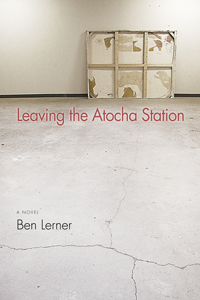 Acclaimed poet Ben Lerner’s first novel is a fascinating and often brilliant investigation of the distance (or the communication) between experience and art. In Leaving the Atocha Station, an aspiring American poet on fellowship in Madrid finds himself in the places between languages, between feeling and thought, between places, and, most often, between lived experience and “the moment of art.”
Acclaimed poet Ben Lerner’s first novel is a fascinating and often brilliant investigation of the distance (or the communication) between experience and art. In Leaving the Atocha Station, an aspiring American poet on fellowship in Madrid finds himself in the places between languages, between feeling and thought, between places, and, most often, between lived experience and “the moment of art.”
The narrator, Adam Gordon, is highly conscious of these various thresholds. The idea of translating language saturates his every encounter, as Adam pretends to understand an event or a person. Perceived misunderstandings about his grasp of Spanish lead him to represent himself in a way he thinks would be in line with expectations about a poet studying abroad. (He constructs elaborate lies about his mother’s death and his father being a fascist.) He often confesses to these manipulations and is dreadfully aware of his dishonesty.
Adam takes pills to quiet the dialogue between his feelings and actions, and he relieves the emptiness of experience by smoking a lot of marijuana, which sparks in him a state of unmitigated appraisal of forms in nature and in conversation. Every significant event — even those he should intensely experience, like having sex – he feels indirectly. He stands in a still-zone while the “actual” passes through him. He is perhaps the very definition of a contemporary poet: an artist dealing with the failure of language and the incapability to meaningfully interact with events.
The novel’s concern with the deconstruction of the “actual” and the “moment of art” is captured in Lerner’s deft description of the act of reading or listening to someone read. “Every sentence, regardless of its subject, became mimetic of the action of the train and the train mimetic of the sentence,” Adam thinks, while reading Tolstoy (in translation!) on the Talgo train, “and I felt coeval with its syntax.”
Adam perceives his own experience as either intensely “coeval” with literature or as unreal or dissatisfying (in that any poetic sentiment working with or against experience is not actual experience). He claims again and again, to the reader and to the other characters, that poetry isn’t about anything, and that any time the word “poet” comes up to describe him it is a derogatory or unjust description, as if Adam were always out-of-body, always seeing himself from across the room.
In a later scene, he is reading John Ashbery. His reading of the poet, who works almost exclusively with the prose-sentence or the expectations of prose, serves Adam’s investigation into the slippery nature of experience:
“It is as though the actual Ashbery poem were concealed from you, written on the other side of a mirrored surface, and you saw only the reflection of your reading. But by reflecting your reading, Ashbery’s poems allow you to attend to your attention, to experience your experience, thereby enabling a strange kind of presence. But it is a presence that keeps the virtual possibilities of poetry intact because the true poem remains beyond you, inscribed on the far side of the mirror.”
This is not only a mainline and highly coherent reading of Ashbery’s work, but it’s a splendid and genuine illustration of how Lerner creates description, too — not just in the book itself, but in how Adam experiences a poetics and can’t think through it effectively. It’s as if the “true poem” is the true experience, hidden on the other side of a straightforward, argumentative, conclusive language that could never truly render in prose what can only be felt in terms of poetry. Adam is dissatisfied with the “failure” of poetry to engage a discernible consciousness and define it. Yet in its ability to inhabit obscurity or abstraction, poetry does provide some understanding.
Adam’s examination of relative experience is pushed further in the novel’s third act, set during the train bombings in Madrid in 2004. Here he considers how the media might take the place of, or construe, a definite real experience. Having been aroused from sleep by the chaos, Adam walks through Atocha Station just after the mayhem. He returns to his apartment to follow the news coverage. “The article described the helicopters I could hear above me,” he says. Here we zoom from the relatively singular experience of the poet struggling with his own value system to a contemporary examination of “experiencing” disaster or war second-hand. The perpetual numbness Adam has felt during most of the novel becomes a quality shared by society at large when it follows traumatic events on the news.
“I wondered if the incommensurability of language and experience was new,” Adam says at one point, “if my experience of my experience issued from a damaged life of pornography and privilege, if there were happy ages when the starry sky was the map of all possible paths, or if this division of experience into what could not be named and what could not be lived just was experience, for all people for all time. Either way, I promised myself, I would never write a novel.” Rendering its subject from just about every angle, Leaving the Atocha Station becomes something close to highly self-aware, to something poetic.
